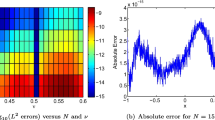Abstract
This work focuses on the solution of the linear matrix ordinary differential equations where the first derivative of the unknown matrix is equal to the same unknown matrix premultiplied by a given matrix polynomial of the independent variable as done in the previous paper. However, this time, not series but perturbation expansions are considered. Sufficient attention is given on the convergence and error estimate issues. The repetitious usage of the perturbation truncations on different but neighbor intervals permits us to define and use so-called “Perturbative Matrix Splines”. This is somehow an analytic continuation issue. Certain illustrative applications are also presented to support the ideas of the work.
Similar content being viewed by others
References
S.Ü. Altınbaşak, M. Demiralp, Solutions to Linear Matrix Ordinary Differential Equations via Minimal, Regular, and Excessive Space Extension Based Universalization: Convergence and Error Estimates for Truncation Approximants in the Homogeneous Case with Premultiplying Polynomial Coefficient Matrix. Submitted to Journal of Mathematical Chemistry (2009)
E.T. Whittaker, G.N. Watson, A Course of Modern Analysis: An Introduction to the General Theory of Infinite Processes and of Analytic Functions; with an Account of the Principal Transcendental Functions, 2nd edn. (Cambridge University Press, Cambridge, 1996) (reprinted)
E.A. Coddington, R. Carlson, Linear Ordinary Differential Equations (Society for Industrial and Applied Mathematics, Philadelphia, PA, 1997)
Demiralp M., Rabitz H.: Lie algebraic factorization of multivariable evolution operators: definition and the solution of the canonical problem. Int. J. Eng. Sci. 33, 307–331 (1993)
S. Üsküplü, M. Demiralp, (2007) Transformation of Ordinary Differential Equations into Okubo Universal Form with Space Extension and its Truncating Approximations, Numerical Analysis and Applied Mathematics, AIP Proceedings, International Conference on Numerical Analysis and Applied Mathematics, (ICNAAM2007), 16–20 Sep 2007, Corfu, Greece, pp. 562–565
Riley K.F., Hobson M.P., Bence S.J.: Mathematical Methods for Physics and Engineering: A Comprehensive Guide, 2nd edn. Cambridge University Press, Cambridge (2002)
C.D. Meyer, Matrix Analysis and Applied Linear Algebra (Society for Industrial and Applied Mathematics, Philadelphia, 2000)
Arfken G.B.: Mathematical Methods for Physicists, 6th edn. Elsevier, London (2005)
Hinch E.J.: Perturbation Methods. Cambridge University Press, Cambridge (2000)
Horn R.A., Johnson C.R.: Matrix Analysis. Cambridge University Press, Cambridge (1985)
Schumaker L.: Spline Functions: Basic Theory, 3rd edn. Cambridge University Press, Cambridge (2007)
Author information
Authors and Affiliations
Corresponding author
Rights and permissions
About this article
Cite this article
Üsküplü Altınbaşak, S., Demiralp, M. Solutions to linear matrix ordinary differential equations via minimal, regular, and excessive space extension based universalization. J Math Chem 48, 253–265 (2010). https://doi.org/10.1007/s10910-010-9665-7
Received:
Accepted:
Published:
Issue Date:
DOI: https://doi.org/10.1007/s10910-010-9665-7



